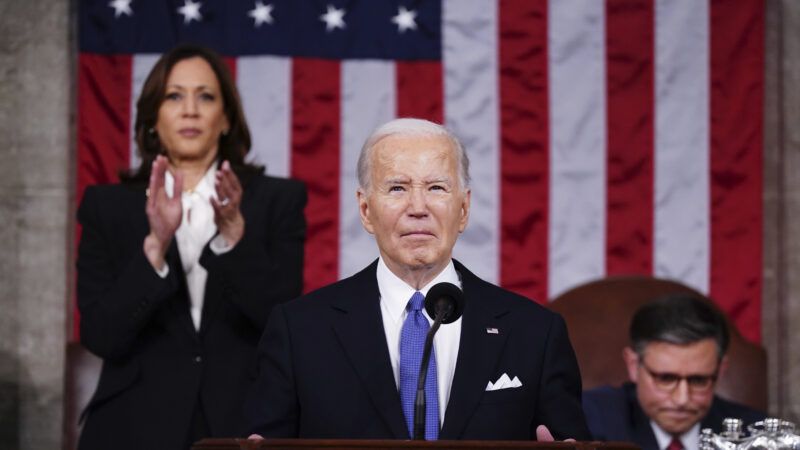Biden's Plan To Subsidize Homebuyers Won't Work
The president's laundry list of proposed tax credits would likely make the problem of high housing costs worse.

America's high housing costs got a brief shout-out in President Joe Biden's State of the Union address tonight, with the president mostly proposing policies that would subsidize demand of this heavily supply-constrained good.
"I know the cost of housing is so important to you. If inflation keeps coming down mortgage rates will come down as well. But I'm not waiting," said Biden, proposing temporary tax credits of $400 a month to compensate for high mortgage rates and the end of title insurance fees for federally backed mortgages.
In addition, Biden proposed cracking down on the price fixing of big landlords and urged Congress to pass his plan to build or renovate 2 million affordable homes.
That housing policy got a shout-out at all in a State of the Union address is somewhat rare, despite housing being the largest line item in most Americans' budgets. Regrettably, most of the policies Biden proposed would do little to address the cause of high housing costs and could make the problem worse.
Higher rents and home prices are a natural consequence of local and state zoning laws, labyrinthine approval processes, federal restrictions on mortgage financing, and environmental reporting laws, to name a few.
All these laws limit the supply of new housing, which drives up the price for any given level of demand. That's a diagnosis the Biden administration itself has endorsed in various housing briefs and "action plans."
Despite that insight, the president's proposals to subsidize home buying will, all else equal, increase demand while leaving supply constraints in place. That will only raise prices further. People who claim new federal subsidies will be no better off. Anyone who misses out on the subsidies will be worse off.
Biden's proposal to crack down on price-fixing landlords is likely a reference to the hot new idea that landlords are illegally colluding on rents by paying for third-party algorithms that propose market-clearing maximum rents.
The Federal Trade Commission and the Department of Justice released a memo earlier this month saying that this could be illegal, without offering any clear guidance on when it would actually be illegal.
Even property owners who set their rents below whatever a third-party algorithm recommends could still be guilty of price fixing.
"Even if some of the conspirators cheat by starting with lower prices than those the algorithm recommended, that doesn't necessarily change things. Being bad at breaking the law isn't a defense," read the memo. One shouldn't expect this garbled threat to do much to move the needle on rents.
In his remarks tonight, Biden didn't elaborate much on the policy he proposed to increase actual housing supply, his plan to build or renovate 2 million affordable homes.
A White House fact sheet circulated earlier today provides a little more detail. The plan, such as it is, would involve increasing the number of tax credits available for low-income housing developers—something the tax bill approved by the House and being considered by the Senate would do.
The White House fact sheet also calls for creating a $20 billion competitive grant program that would directly fund affordable apartments, "pilot innovative models" for affordable housing production, and, more interestingly, "incentivize local actions to remove unnecessary barriers to housing development."
When it comes to housing funding, $20 billion is a lot of money. It's nearly a third of the current budget for the U.S. Department of Housing and Urban Development.
As part of its existing "housing supply action plan," the Biden administration has allegedly retooled a number of federal transportation grant programs to incentivize local zoning changes. As I've written, that doesn't seem to have made much of an impact on where those grants go. San Francisco, the nation's beating heart of anti-development regulations, got one of the largest grant awards from one of these supposedly retooled programs.
Congress has also passed a smaller, $85 million "baby YIMBY" grant program more focused on paying local governments to change their zoning rules. Here too, the language of the grant program (and the applications it's received thus far from localities) suggests it will end up being more of a subsidy for routine planning work than a powerful incentive for liberalizing zoning laws.
Given the difficulty state governments have had trying to prod local governments into being more pro-housing with explicit zoning preemptions, I'm skeptical of how much federal carrots can do here.
Perhaps the best thing the president can do for zoning reform is to use his bully pulpit to argue for it. Biden had an opportunity to do that tonight, and he didn't take it. It was a missed opportunity.
Rent Free is a weekly newsletter from Christian Britschgi on urbanism and the fight for less regulation, more housing, more property rights, and more freedom in America's cities.


Show Comments (26)